
Editorial Board
PCD’s editorial board consists of a diverse group of independent leaders and experts with experience in various areas of public health research, evaluation, and practice. Editorial board members are volunteers who advise the journal on its policies and identify appropriate and timely topics for publication. Editorial board members may also serve as peer reviewers and as judges for the journal’s student paper contest. In addition, the editorial board assists with identifying ways to disseminate the journal’s content throughout the world.
Diego M. Ardenghi, DDS, MA (Educ), MSc, Dip in Prosthodontics, FRCD(C)
Associate Professor of Teaching (Educational Leadership Stream)
Faculty of Dentistry
University of British Columbia
Vancouver, BC, Canada

Dr Diego Ardenghi is an Associate Professor of Teaching (Educational Leadership Stream) at the Faculty of Dentistry, at the University of British Columbia (UBC), Vancouver, Canada. His experience includes a master of arts degree in Curriculum and Instruction from the Faculty of Education (UVic) and an MSc and Diploma in Prosthodontics from UBC. Diego also has research interests in Evaluation of Dental Care Services for the Geriatric population.
Appointment Term: 2023–2026
Sergio Aguilar-Gaxiola, MD, PhD
Professor of Clinical Internal Medicine
School of Medicine, University of California, Davis
Sacramento, California
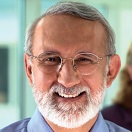
Dr Aguilar-Gaxiola is a professor of clinical internal medicine at the School of Medicine, University of California, Davis. He is the founding director of the Center for Reducing Health Disparities at UC Davis Health and the director of the Community Engagement Program of the UCD Clinical Translational Science Center (CTSC). He is a national and international expert on health and mental health comorbidities in diverse populations. Dr Aguilar-Gaxiola’s applied research program has focused on identifying unmet mental health needs and associated risk and protective factors to better understand and meet population mental health needs and achieve equity in health and mental health disparities in underserved populations. Dr Aguilar-Gaxiola is the author of more than 190 scientific publications. He received an MD from the School of Medicine, Autonomous University of Guadalajara, and a PhD in clinical–community psychology at Vanderbilt University.
Appointment Term: 2021–2025
Robert E. Bailey II, MPH
Team Lead
Program, Communications, and Training
Division of Cancer Prevention and Control
National Center for Chronic Disease Prevention and Health Promotion
Centers for Disease Control and Prevention
Atlanta, Georgia

Robert E. Bailey II is the Program, Communications, and Training Team Lead for CDC’s Division of Cancer Prevention and Control. His team is responsible for providing funding and guidance to all 50 states and the District of Columbia to advance cancer prevention, early detection, treatment, survivorship supports, and health equity. Robert has worked in multiple leadership roles at CDC, including supporting CDC’s COVID-19 response, serving as acting Branch Chief and Team Lead within CDC’s Division of Community Health, and leading national partnership efforts, campaigns, and mobilization for CDC’s Division of HIV/AIDS Prevention (DHAP). Robert also managed the Tuberculosis Epidemiologic Studies Consortium and worked as a public health analyst on evaluation practices for DHAP’s Program Evaluation Research Branch. His background includes working as a consultant for nonprofit organizations and small businesses.
Appointment Term: 2022–2026
Tina Bauermeister, MS, RDN, LD, CDCES
Registered Dietitian Nutritionist
Certified Diabetes Care and Education Specialist
Avera Holy Family Hospital
Estherville, Iowa

Ms Tina Bauermeister is a licensed and registered dietitian—nutritionist in a rural critical access hospital, and she has a leadership role with 11 direct reports. Ms Bauermeister has been the coordinator and leader of the CDC recognized Diabetes Prevention Program for 10 years at her hospital along with other community-based, behavior-change programs.
Ms Bauermeister provides medical nutrition therapy to patients with other chronic conditions and talks to patients daily about their treatment, continuous glucose meters, and therapeutic diets. She is one of the editors of the Iowa Academy of Nutrition and Dietetics Simplified Diet Manual, 13th Ed. This diet manual is used in nursing homes and critical access hospitals to treat inpatients and residents. Ms Bauermeister also has extensive knowledge in diabetes management, prediabetes and diabetes prevention. This special training has helped her earn certification in diabetes care and education.
Ms Bauermeister completed her undergraduate degree in human nutrition and dietetics at Arizona State University. Her master’s degree, also in human nutrition and dietetics is from Eastern Michigan University. Her previous research experience has focused on the effects of fructose malabsorption in children.
Appointment Term: 2024–2027
Zachary A. Brian, DMD, MHA, FICD
Associate Professor
Director, Dentistry in Service to Community (DISC)
University of North Carolina at Chapel Hill
Adams School of Dentistry
Division of Pediatric and Public Health

Dr Brian, Associate Professor and Director of the Dentistry in Service to Community (DISC) Program at UNC Chapel Hill Adams School of Dentistry (ASOD), has devoted his career to promoting public health, policy, and health equity for underserved communities. Before entering academia, he held various clinical and administrative roles, including Site Director for the Indian Health Service (IHS) with the Sault Tribe of Chippewa Indians and Dental Director at an FQHC in partnership with Yale University. He also led coalition-building, community organizing, and policy reform as Director and Vice President of Impact, Strategy and Programs at an oral health–focused North Carolina nonprofit.
In his advisory capacities with the American Association of Public Health Dentistry (AAPHD), the Association of State and Territorial Dental Directors (ASTDD), the American Dental Association (ADA), and the National Network for Oral Health Access (NNOHA), Dr Brian encourages innovation, interdisciplinary care, clinical excellence, and policy advocacy for health system transformation. Beyond his role on the editorial board of the CDC journal Preventing Chronic Disease, he is a peer reviewer for the Academy of General Dentistry and serves on the Chatham County Board of Health. Dr Brian obtained his bachelor of science from Murray State University, doctor of medicine in chemistry from the University of Louisville, and master of health care administration from Central Michigan University and is a member of the International College of Dentists.
Appointment Term: 2020–2025
Pamela L. Carter-Nolan, PhD, MPH
Director, Master of Public Health Program
Howard University Graduate School
Washington, DC

Prior to her current position, Dr Carter-Nolan was director of public health research at IQ Solutions, Inc, a public health consultancy firm. In this role her primary responsibility was to supervise and support the National Institutes of Health Office of Disease Prevention’s (NIH-ODP’s) prevention research taxonomy project. From 2010 to 2015, Dr Carter-Nolan served as assistant dean of medical education and vice chair of the Community and Family Medicine Department at the Howard University College of Medicine. She is an investigator and educator who has designed, implemented, and led several training programs, curricula, and courses focused on clinical translational science and health disparities–related topics. She has also led efforts in curriculum and course development and planning of public health programs and medical education. Dr Carter-Nolan is the co-director for the faculty development component of the Research Centers in Minority Institutions (RCMI) at Howard University and the co-director for the Cancer Research Education Program for the Howard–Georgetown Collaborative Partnership in Cancer Research, which are both NIH-funded initiatives. Dr Carter-Nolan received a BS in community health education from the University of Massachusetts, an MPH in health policy from Yale University, and a PhD in epidemiology from the University of Pittsburgh.
Appointment Term: 2020–2026
Zuri Dale, MWM, MPH
Executive Director of Research and Innovation
Adjunct Faculty Division of Health Sciences
College of Pharmacy and Health Sciences
Texas Southern University
Houston, Texas

Ms Dale is an infectious disease epidemiologist and public health scientist whose current scientific work emphasizes the epidemiology of infectious diseases. Ms Dale has worked at the federal, state, academic, and private levels on research that spans SARS COV-2, volatile organic compounds, E. coli, and trace minerals in ecosystems at numerous institutions, including the National Aeronautics and Space Administration, the Centers and for Disease Control and Prevention, and the Texas Parks and Wildlife Association. She is a member of the American Public Health Association, is a Moderna-designated global medical expert, serves on the Moderna Advisory Board for COVID-19, and has held teaching assignments at Texas Southern University and Princeton University. At Texas Southern University, she serves as the executive director of Research and Innovation, a director of the COVID Prevention Center, and the executive director of the Center for Transformative Health.
Appointment Term: 2023–2026
Sunita Dodani, MBBS (MD), FCPS, MSc, PhD, FAHA
Visiting Clinical Professor of Medicine
University of Illinois College of Medicine Peoria (UICOMP)
Founding Director
Center 4 Health Research (C4HR)
Peoria, Illinois

Dr Dodani has served as an executive leader for more than 20 years with vast experience in research management and creating innovative models of health promotion. In her current position, she is dedicated to improving the quality of health care in Greater Peoria, Illinois, and striving to improve population health, reduce disparities, and create high-performing, sustainable health systems through the use of health care analytics tools. Dr Dodani is an NIH-funded outcome implementation scientist and has developed several cardiovascular disease prevention programs for diverse races and ethnic communities. Prior to her appointment at UICOMP in August 2023, she was a professor of medicine at Eastern Virginia Medical School (EVMS) and also held a secondary appointment as a professor of epidemiology in the School of Health Professions at EVMS. Additionally, Dr Dodani was the founding director of the EVMS-Sentara Healthcare Analytics and Delivery Science Institute (HADSI), which is a leading research institution focused on improving patient outcomes through the use of data analytics and innovative health promotion models. Dr Dodani is nationally and internationally known for her mentoring skills and has helped to develop more than 100 physician–scientists.
Appointment Term: 2022–2026
Hirut Gebrekristos, PhD
Associate Professor
College of Health Professions
Department of Public Health
Mercer University
Atlanta, Georgia

Dr Hirut Gebrekristos is an associate professor of public health at Mercer University. Her teaching responsibilities include social epidemiology and social determinants of health. Her research interests include health inequalities and epidemiologic methods. Over 20 years of HIV research experience among vulnerable and marginalized populations forms her interest in health inequalities. She has experience in collaborative research on chronic obstructive pulmonary disease (COPD) and stroke. Overall, her research is focused on developing methods that can help translate research into practical public health interventions and programs. Dr Gebrekristos earned her doctorate in epidemiology from Johns Hopkins University, her master’s in public health from Yale University’s International Health Program, and a bachelor’s degree in anthropology from Mount Holyoke College.
Appointment Term: 2024–2027
Sheba M. George, PhD
Associate Professor, Department of Preventive and Social Medicine
Program Director, Health Careers Opportunity Program
Community Health Worker Academy
Charles R. Drew University of Medicine and Science
Adjunct Professor, Department of Community Health Sciences
University of California at Los Angeles, Fielding School of Public Health
Los Angeles, California
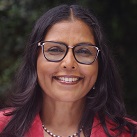
Dr Sheba George is an associate professor in the Department of Preventive and Social Medicine, at Charles R. Drew University in Los Angeles, California, and an adjunct professor in the Department of Community Health Sciences at the University of California at Los Angeles, Fielding School of Public Health. Dr George has extensive expertise in implementing social-scientific theories and qualitative, quantitative, and community-engaged methods of studying health inequities among racial and ethnic under-resourced populations. Her areas of focus have included the digital divide and its impact on meaningful use of health information technology, research participation among under-resourced groups, and a cultural framework for health. Her recent work has concentrated on health professional training with community health workers in under-resourced clinical settings.
Appointment Term: 2022–2026
Paulette Grey Riveria, MD, MPH, MBA
Regional Administrator / Regional Medical Director
Louisiana Department of Health, Office of Public Health, Region 2
Primary Care Practitioner
Baton Rouge, Louisiana

Dr Paulette Grey Riveria is a family medicine physician and public health leader with global experience. Through her private consulting firm, she provides primary care and public health consulting to community groups, businesses, and governments. Additionally, she currently serves as a Regional Medical Director within the Louisiana Department of Health, overseeing public health programs across 7 parishes in Louisiana. Her primary care and public health work focuses on health literacy, disease prevention, and health care justice. She received her medical degree from Johns Hopkins University School of Medicine, a master’s degree in public health from Harvard School of Public Health, and an MBA from the University of Illinois at Chicago.
Appointment Term: 2022–2026
Jeffrey E. Hall, PhD, MA, MSPH, CPH
Deputy Director, Office of Minority Health and Health Equity and Chief of the Minority Health and Health Equity Team
Office of Minority Health & Health Equity
Centers for Disease Control & Prevention
Atlanta, Georgia

Dr Hall serves as deputy director of the Office of Minority Health and Health Equity (OMHHE) and chief of the Minority Health and Health Equity team for the Centers for Disease Control and Prevention (CDC) with key involvement in substantive health matters and in health policy and program development. Dr Hall works to assure that the OMHHE helps to accelerate CDC’s health impact in improving population health and eliminating health disparities in the US. He provides leadership across several OMHHE priorities, including strategic planning, technical consultation and assistance, refining OMHHE’s health equity framework and grounding concepts and principles, elaborating workforce diversity as a social determinant of health, and measuring and monitoring progress toward health equity. Prior to joining OMHHE, Dr Hall was lead behavioral scientist in the Surveillance Branch of the Division of Violence Prevention in CDC’s National Center for Injury Prevention and Control. Dr Hall has a PhD in medical sociology, an MSPH in epidemiology, and an MA in sociology from the University of Alabama at Birmingham (UAB). Dr Hall is currently an adjunct faculty member in UAB’s Department of Sociology.
Appointment Term: 2020–2026
Kathleen Hoke, JD
Professor, University of Maryland Carey School of Law
Director, Network for Public Health Law–Eastern Region
Director, Legal Resource Center for Public Health Policy
Baltimore, Maryland
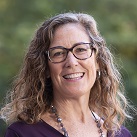
Dr Hoke is a professor in the University of Maryland Carey School of Law, where she teaches public health law and policy, including at the innovative Public Health Law Clinic, and operates two legal resource centers. She provides technical legal assistance to state and local health officials, legislators, researchers, and organizations working to use law and policy change to improve public health. In 2016, Dr Hoke received the Jennifer Robbins Award for the Practice of Public Health Law from the APHA Law Section, and in 2019 she was appointed by the Maryland governor to the State Council on Cancer Control. Dr Hoke has published articles in law journals and the social science literature. She graduated as a member of the Order of the Coif from the University of Maryland School of Law in 1992 and served with distinction as special assistant to the attorney general of Maryland prior to joining the School of Law in 2002.
Appointment Term: 2020–2025
Sara L. Huston, PhD
Lead Chronic Disease Epidemiologist
Maine Center for Disease Control and Prevention
Augusta, Maine

In addition to her post at the Maine Center for Disease Control and Prevention, Dr Huston is an assistant research professor at the Muskie School of Public Service at the University of Southern Maine. She is also an Epidemic Intelligence Service alumna. Dr Huston has more than 20 years of experience in applied epidemiology and surveillance of chronic disease at state health departments. She also served on the executive board of the Council of State and Territorial Epidemiologists. She received a BA from Hampshire College and a PhD from the University of Pittsburgh Graduate School of Public Health.
Appointment Term: 2020–2025
Caitlyn L. Jasumback, MSPH
Research Associate
Comagine Health
Salt Lake City, Utah

As a research associate with Comagine Health, Mrs Jasumback conducts mixed methods research and evaluation on substance use disorder and reproductive health. In her previous position with the Utah Department of Health and Human Services, she developed multiple evaluation plans and data collection tools to assess the effectiveness of programs to address diabetes and heart disease. She also conducted research as a Peace Corps volunteer in Eswatini that has informed different screening processes for STIs and TB. Mrs Jasumback received a Bachelor of Science degree in biology at Westminster College and a Master of Science degree in public health from the University of Utah and was elected to the Delta Omega Honorary Society in Public Health.
Appointment Term: 2024–2027
Rachel Kaufmann, PhD, MPH
Associate Director for Science
National Center for Chronic Disease Prevention and Health Promotion
Centers for Disease Control and Prevention
Atlanta, Georgia
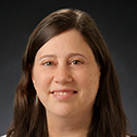
Dr Kaufmann is the associate director for science for the National Center for Chronic Disease Prevention and Health Promotion (NCCDPHP) at the Centers for Disease Control and Prevention (CDC). The NCCDPHP houses programs in population health, cancer control and prevention, diabetes translation, heart disease and stroke prevention, reproductive health, physical activity and nutrition, oral health, and tobacco use. Before joining NCCDPHP in 2016, she served in similar roles for CDC’s Center for Surveillance, Epidemiology, and Laboratory Services, Epidemiology and Analysis Program Office, and Office on Smoking and Health. She was also seconded by CDC to the World Bank for Pollution Management and Environmental Health for 5 years. Dr Kaufmann received a BA from Brown University and an MPH and PhD from the University of Michigan.
Appointment Term: 2020–2026
Melinda Krakow, PhD, MPH
Faculty Instructor
John D. Bower School of Population Health
University of Mississippi Medical Center
Jackson, Mississippi
Senior Health Communications Researcher
Professional Data Analysts
Minneapolis, Minnesota

Dr Krakow is a faculty instructor in the John D. Bower School of Population Health at the University of Mississippi Medical Center, where she teaches graduate courses in science communication and implementation science and dissemination. She is also a senior health communications researcher with Professional Data Analysts, a public health research and evaluation firm. Her research interests include health communication, program evaluation, survey research methodology, and cancer control. Dr Krakow received a master of public health degree in biostatistics and epidemiology from Johns Hopkins Bloomberg School of Public Health and a doctorate in health communication from the University of Utah. She completed a postdoctoral cancer prevention fellowship at the National Cancer Institute, working in the Division of Cancer Control and Population Sciences on a wide range of cancer control projects, including administration of the Health Information National Trends Survey.
Appointment Term: 2023–2026
LaTisha Marshall, DrPH, MPH
Adjunct Assistant Professor
Department of Behavioral, Social, and Health Education Sciences
Rollins School of Public Health at Emory University
Public Health Advisor
National Center for Chronic Disease Prevention and Health Promotion
Centers for Disease Control and Prevention
Atlanta, Georgia

Dr Marshall is a public health advisor at CDC. She has over 20 years of experience providing expertise in the areas of surveillance, evaluation, strategic planning, and health equity. She has worked with US federal and state governments and tribal programs and in other countries to advance and improve the health of communities both here and abroad. In addition, she has led multiple studies within public and private health care settings that have contributed to new patient care initiatives. During the COVID-19 pandemic, she led a contact tracing and case investigation team in the Navajo Nation and served as Deputy Senior Tribal Advisor for CDC.
Most recently, she served as Lead Guest Editor on a collection of published papers highlighting public health’s role in educating communities about evidence-based interventions to create healthier and more equitable communities, particularly among those who have been affected by menthol and flavored tobacco.
Dr Marshall serves as an adjunct assistant professor within the Department of Behavioral, Social, and Health Education Sciences at the Rollins School of Public Health at Emory University. She holds a bachelor of science degree from Syracuse University in New York, a master’s degree in public health from the State University of New York at Albany, and a doctorate degree from the University of Georgia in Athens. She is also a member of Delta Omega Honorary Society in Public Health.
Appointment Term: 2025–2028
Anwar Merchant, MPH, ScD, DMD
Professor
Epidemiology Division Director
Department of Epidemiology and Biostatistics
University of South Carolina
Columbia, South Carolina

Dr Anwar Merchant works in the areas of nutrition, oral health, chronic disease, aging, and cognition. He has an interest in using causal inference methods to evaluate the effects of interventions using observational data when it is infeasible to conduct randomized controlled trials, identify pathways through which interventions may or may not affect health outcomes, identify subgroups of individuals among whom the effects of interventions and policies may vary, and correct for bias in epidemiologic studies. Dr Merchant has a DMD from Shiraz University, and MPH and ScD degrees from Harvard University. He is a fellow of the American College of Epidemiology and serves on the Council on Scientific Affairs of the American Dental Association.
Appointment Term: 2023–2026
Lloyd Michener, MD
Professor, Department of Family Medicine & Community Health, Duke School of Medicine
Clinical Professor, Duke School of Nursing
Adjunct Professor, Public Health Leadership, UNC Gillings School of Global Public Health

Dr Michener is a professor and past chair of Community & Family Medicine at Duke. He has served as director of the Duke Center for Community Research; co-chair of the Community Engagement Steering Committee for the Clinical and Translational Science Awards of the National Institutes of Health (NIH); and president of the Association for Prevention, Teaching and Research. He has also been a member of the National Academies Institute of Medicine Committee on Integrating Primary Care and Public Health; the board of directors of the Association of Academic Medical Colleges; the NIH Council for Complementary and Alternative Medicine; and the National Academic Affiliations Advisory Council for the Department of Veterans Affairs. He now leads the Practical Playbook with the support of the deBeaumont Foundation, linking health care, public health, and communities.
Appointment Term: 2019–2025
Carlos A. Reyes-Ortiz, MD, PhD
Associate Professor
Institute of Public Health, Behavioral Sciences & Health Education
College of Pharmacy and Pharmaceutical Sciences
Florida A & M University
Tallahassee, Florida
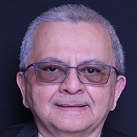
Dr Reyes-Ortiz’s research includes studies on geriatric syndromes and cancer health disparities among older Hispanic populations in the United States and other Latin American and Caribbean countries. He discovered an association between a history of various types of abuse and falling, followed by the association between life course psychological trauma or adverse events with falling and frailty. He has authored more than 160 articles and book chapters. Dr Reyes-Ortiz received his medical degree from the School of Medicine, University of Valle, Cali, Colombia, and his doctorate degree in preventive medicine and community health from the University of Texas Medical Branch, Galveston, Texas. He completed his residency training in family medicine and 3 geriatric medicine fellowships in Spain and the United States He received his first Fulbright Scholar Award in 2017, and his most recent was awarded in 2022.
Appointment Term: 2022–2026
Christine Riedy Murphy, PhD, MPH
Delta Dental Associate Professor and Chair
Department of Oral Health Policy and Epidemiology
Harvard School of Dental Medicine
Boston, Massachusetts
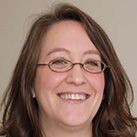
Dr Riedy Murphy is the Delta Dental of Massachusetts Associate Professor in Oral Public Health and Epidemiology at the Harvard School of Dental Medicine (HSDM). She is chair of the Department of Oral Health Policy and Epidemiology at HSDM and director of the Center for Integration of Primary Care and Oral Health, one of 6 academic units for primary care training enhancements with the Health Resources & Services Administration’s (HRSA’s) Bureau of Health Workforce. She is also the director of the National Center for Equitable Care for Elders, a national training and technical assistance partner with HRSA’s Bureau of Primary Health Care. She served on the technical advisory panel for the 2019 Health Center Patient Survey. Dr Riedy Murphy received a master’s degree and a doctoral degree in psychology and an MPH in health services from the University of Washington.
Appointment Term: 2020–2026
Magaly Rodriguez de Bittner, PharmD
Professor and Associate Dean for Clinical Services and Practice Transformation
Department of Pharmacy Practice and Science
University of Maryland School of Pharmacy
Baltimore, Maryland

Dr Rodriguez de Bittner is executive director of the Center for Innovative Pharmacy Solutions at the University of Maryland School of Pharmacy. Her work has led to the development of innovative and nationally recognized programs, including the Giant Diabetes Education Program and the Maryland P3 Program. She served as director of the Community Pharmacy Residency Program at the University of Maryland (1996–2006) and currently is a preceptor. She has worked with the Centers for Disease Control and Prevention to advance the role of pharmacists in chronic disease management. She is past president of the Maryland Pharmacists Association and the American Pharmacists Association Foundation Board (2006 to 2008). Her leadership has led to quantifiable improvements in chronic disease management through medication use by improving medication adherence and developing diabetes and cardiovascular programs based on national treatment guidelines and evidence-based medicine. She received the American Pharmacists Association Foundation’s Pinnacle Award for Individual Career Achievement in 2015. She received a BS from the University of Puerto Rico School of Pharmacy and a PharmD from the University of Maryland.
Appointment Term: 2020–2025
Elizabeth Rohan, PhD, MSW, LCSW
Health Scientist
Division of Cancer Prevention and Control
Centers for Disease Control and Prevention
Atlanta, Georgia

Dr Rohan is a health scientist in the Division of Cancer Prevention and Control at the Centers for Disease Control and Prevention (CDC). Her research portfolio is based on her experience with people diagnosed with cancer and their families, distress screening among cancer survivors, and other psychosocial concerns. Her health services research focuses on patient navigation and community health worker interventions. She is a founding member of the Community Health Worker Workgroup at CDC and a member of the National Navigation Roundtable and the National Lung Cancer Roundtable. Dr Rohan graduated from Boston College with a bachelor’s degree in sociology and a master’s degree in social work; she earned her PhD in sociology and social work from Boston College. Dr Rohan has worked as a clinical oncology social worker at Massachusetts General Hospital and Dana-Farber Cancer Institute. She has served as an adjunct faculty member at Boston College, Boston University, the University of Louisville, and Oglethorpe University.
Appointment Term: 2023–2026
John Salerno, PhD, MPH
Provost Postdoctoral Research Scientist
Lecturer
School of Social Work
Columbia University
New York, New York

Dr Salerno is a provost’s postdoctoral research scientist and lecturer at the Columbia University School of Social Work. Dr Salerno obtained a doctorate in behavioral and community health and a graduate certificate in measurement, statistics, and evaluation at the University of Maryland; he earned a master of public health and bachelor’s degree in psychology at the University of Miami. Dr Salerno’s work focuses on addressing mental health disparities and inequities among Latinx youth communities, including undocumented immigrants, immigrants from the Northern Triangle (ie, El Salvador, Guatemala, and Honduras), and LGBTQ+ youth. Through his work, he seeks to reveal and address complex subordinations that affect mental health among marginalized groups through intersectional, critical, and community-engaged research methods and paradigms. Dr Salerno’s recent research, funded by an R36 grant from the National Institute of Mental Health, explores identity-related risk and resilience factors for mental health outcomes among Latinx immigrant adolescents from the Northern Triangle, using critically oriented frameworks (ie, intersectionality, life-course, and minority stress theories), community-based participatory research methodology, and a combination of quantitative methods, including survey development and implementation, and linear and mixture statistical modeling.
Appointment Term: 2023–2026
Charlotte D. Smith, PhD
UC Berkeley School of Public Health
Environmental Health Sciences
Berkeley, California

Dr Smith is a faculty member of the School of Public Health at the University of California, Berkeley, and a visiting professor at the Universidad Jesuita de Guadalajara (Instituto Tecnológico y de Estudios Superiores de Occidente). Her research interests include the microbial ecology and control of waterborne pathogens and the use of geospatial statistics to explore the pathway from environmental exposures, including contaminated water, to diarrheal and/or kidney disease. Current community-based participatory research in Guadalajara focuses on access to water as a human right under UN Resolution 64-292. Dr Smith has a BS in microbiology from the University of Michigan, an MA in community health from the City University of New York, and a PhD in environmental health sciences from the University of California, Berkeley. She is a member of the United Nations Global Geospatial Information Management–Academic Network of the Americas and GIS Latin America. She received the Jorge Matute Remus Award in 2019.
Appointment Term: 2023-2025
Sergey Sotnikov, PhD
Economist
Performance Development, Evaluation, and Training Branch
Division of Performance Improvement and Field Services
Center for State, Tribal, Local, and Territorial Support
Centers for Disease Control and Prevention
Atlanta, Georgia

Dr Sotnikov joined the Centers for Disease Control and Prevention (CDC) as a Prevention Effectiveness Fellow in 2002. He received a PhD in agricultural economics from Iowa State University with specialization in international and environmental economics and agricultural policy analysis. Before coming to CDC, Dr Sotnikov was a consultant to the World Bank and the Food and Agriculture Organization of the United Nations. He has traveled extensively across the Eurasia region, advising governments on agricultural, social policy, and production efficiency issues. Dr Sotnikov’s research interests in public health are in developing quantitative methods of performance and effectiveness assessment of public health agencies, application of social network analysis to measurement of partnership relations in public health, and quantitative evaluation of the effects of public health.
Appointment Term: 2023-2025
Susan Swider, PhD, PHNA-BC, FAAN
Professor, Department of Community, Systems and Mental Health Nursing
Rush University
Chicago, Illinois

Dr Swider has worked for more than 30 years in acute care, home health care, and public health. She is program director for two doctor of nursing practice programs in which practicing registered nurses specialize in public health and nurse practitioners specialize in population health to enhance primary care. Students in these programs address a range of illnesses from a public or population health perspective, including communicable disease, chronic illness, and health promotion and disease prevention for vulnerable populations. Dr Swider’s research has focused on using community health workers for health promotion and disease prevention among vulnerable populations. In 2011, President Obama appointed her to the Advisory Group on Prevention, Health Promotion, and Integrative and Public Health, a group designed to advise on the development and implementation of the National Prevention Strategy. She currently serves on the Illinois State Board of Health and the Community Preventive Services Task Force of the Centers for Disease Control and Prevention. Dr Swider is a fellow of the American Academy of Nursing and the Institute of Medicine of Chicago. She received a BSN from DePaul University and an MS in public health nursing and a PhD in nursing science from the University of Illinois at Chicago.
Appointment Term: 2020–2026
Vetta Sanders Thompson, PhD
E. Desmond Lee Professor of Racial and Ethnic Studies
George Warren Brown School of Social Work
Washington University in St. Louis
St. Louis, Missouri
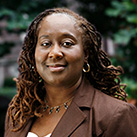
Dr Sanders Thompson is the E. Desmond Lee Professor of Racial and Ethnic Studies at the Brown School, Washington University in St. Louis. She serves as codirector of the Center for Community Health Partnership and Research at the Institute for Public Health at Washington University, is an associate member of the Siteman Cancer Center, and is a faculty affiliate of the Department of African and African-American Studies and of the Interdisciplinary Program in Urban Studies. Dr Sanders Thompson, a licensed psychologist and health service provider in the state of Missouri, is a past chair of the State Committee of Psychologists and a past president of the Missouri Psychological Association. She received a PhD from Duke University.
Appointment Term: 2020–2026
Calvin Tribby, PhD, MPH
Geographic Information Systems (GIS) Analyst
Department of Population Sciences
Beckman Research Institute, City of Hope
Duarte, California

Dr Calvin Tribby is a GIS analyst in the Department of Population Sciences at the Beckman Research Institute, City of Hope at the Duarte, California location. His research examines geospatial and contextual factors associated with cancer prevention behaviors. This includes research in active transportation, such as walking, bicycling, and public transit; and in sun exposure, physical activity, and the school context. Dr Tribby earned his master’s degree in public health, concentrating in biostatistics from the Mailman School of Public Health at Columbia University. He earned his doctorate in geography from The Ohio State University. Dr Tribby also holds an a master’s degree in geography and a bachelor’s degree in mathematics, both from the University of New Mexico.
Appointment Term: 2024–2027
Raegan Tuff, PhD, MPH
Public Health Analyst
Office of Informatics and Information Resources Management
National Center for Chronic Disease Prevention and Health Promotion, Office of the Director
Centers for Disease Control and Prevention
Atlanta, Georgia

Dr Tuff is a public health analyst at the Centers for Disease Control and Prevention, where she applies informatics strategies and information systems to public health practice. She also researches social determinants of health and equity to improve health outcomes in minority populations such as women and African Americans. She received an MPH in social and behavioral science from Morehouse School of Medicine and a PhD in health promotion and behavior from the University of Georgia College of Public Health. Dr Tuff is a member of Leadership Women and Delta Omega.
Appointment Term: 2020–2026
Johnny Uelmen, PhD, MS
Assistant Director
Triangle Center for Evolutionary Medicine
Duke University
Durham, North Carolina
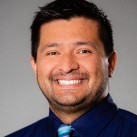
Dr Uelmen is the assistant director for the Triangle Center for Evolutionary Medicine (TriCEM) at Duke University. Focusing on interdisciplinary collaborations with scientists, physicians, veterinarians, public health officials, and policy makers, Dr Uelmen’s research evaluates disease risk to humans and animals under anthropogenic changes to the environment and climate. With formal training in entomology and epidemiology, he uses a variety of tools and statistical methodology to test hypotheses, including geographic information systems (GIS), artificial intelligence, machine learning, and analyses of longitudinal and big data. Dr Uelmen is a strong advocate and mentor for underrepresented students in the science, technology, engineering, and mathematics fields. Through TriCEM, he connects leaders in multiple health and science fields to young scientists, students, and communities to educate and inform the dynamic and interconnected relationships between disease, health, and evolution.
Appointment Term: 2023–2026
Robin Vanderpool, DrPH, MPH
Branch Chief
Health Communication and Informatics Research Branch
Behavioral Research Program
Division of Cancer Control and Population Sciences
National Cancer Institute
Bethesda, Maryland

Dr Vanderpool is chief of the Health Communication and Informatics Research Branch in the Division of Cancer Control and Population Sciences at the National Cancer Institute (NCI). As branch chief, Dr Vanderpool leads the development of health communication research initiatives in areas such as cancer communication surveillance, patient-centered communication, connected health, and online health information. Dr Vanderpool also collaborates with the NCI Office of Cancer Centers on community outreach and engagement initiatives across NCI-designated cancer centers. Prior to joining NCI, Dr Vanderpool was a professor in the College of Public Health at the University of Kentucky (UK) and associate director for community outreach and engagement at the UK Markey Cancer Center, where she led several research initiatives funded by NCI and CDC. Dr Vanderpool earned a doctorate in health behavior from UK, a master of public health degree in public health education from Western Kentucky University, and a bachelor of science degree in psychobiology from Centre College.
Appointment Term: 2023–2026
The opinions expressed by authors contributing to this journal do not necessarily reflect the opinions of the U.S. Department of Health and Human Services, the Public Health Service, the Centers for Disease Control and Prevention, or the authors’ affiliated institutions.

